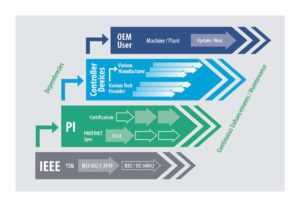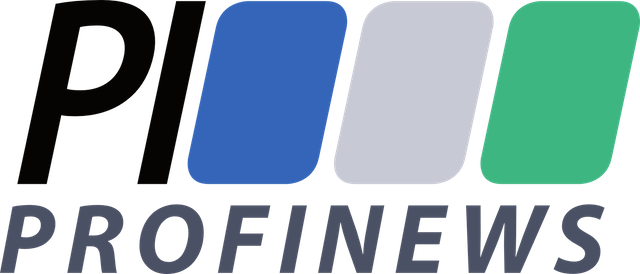Since the PROFINET specification V2.4 was released with integrated TSN functionality, PI (PROFIBUS and PROFINET International) has consistently been working on the implementation of further components for a successful market launch – thereby firmly upholding the PI motto, “Go digital. Go PROFINET.” This makes it especially necessary to exercise close coordination and cooperation with partners from other organizations and the various stakeholders within the active PI community so that the TSN technology and application can work smoothly together across all levels of industrial automation.
Through the use of IEEE’s relevant Ethernet standards and based on use cases, a joint working group in the IEC has partnered with the IEEE in developing the IEC/IEEE 60802 TSN Profile for Industrial Automation. The profile defines suitable functions of TSN but also the configuration mechanisms for a convergent TSN network. A first internal draft has already been prepared. Experts from PI member companies have been strongly involved in this process.
The experiences of various technology manufacturers have resulted in improvements and additions as well as regular maintenance work in the overlying layers of the PROFINET specification. Furthermore, the current version of the PROFINET specification is being populated within the framework of the initiated maintenance cycle of the IEC 61158.
This version of the PROFINET specification creates a basis for the development of test cases and the implementation of the PROFINET tester for certification. After PI worked out a test concept for TSN at an early stage and is now working on the implementation of the first test cases, the planning of further tests for a convergent network is now also underway.
 Using these technology bases, the manufacturers are working at full speed on the implementation of their PROFINET solutions. A cross-vendor TSN technology demo has been installed on the PI booth at trade fairs to demonstrate its interoperability. Experienced specialists are attending seminars and developer workshops to impart the details and background information as well as the next steps of the specifications. The keen interest among manufacturers is evident from the specific questions they are asking about implementing the technology.
Using these technology bases, the manufacturers are working at full speed on the implementation of their PROFINET solutions. A cross-vendor TSN technology demo has been installed on the PI booth at trade fairs to demonstrate its interoperability. Experienced specialists are attending seminars and developer workshops to impart the details and background information as well as the next steps of the specifications. The keen interest among manufacturers is evident from the specific questions they are asking about implementing the technology.
But also the most crucial level – namely, the users themselves – are now much more involved than before. The focus of current consultations is not the TSN mechanisms themselves, but rather their application: How can a TSN network be constructed and configured? What does Gbps mean, and how can existing devices and system parts be connected? How can the increasingly necessary vertical communication with higher-level systems, e.g., cloud/edge, be installed in the same step?
On the whole, the many constructive conversations on the different levels reveal that PI’s clear I4.0 strategy have been accepted in the meantime. TSN can thus be advantageously utilized as a future-proof common Layer 2 technology for PROFINET communication in the field, and OPC UA can be used for both the horizontal controller-to-controller and vertical communication. Consistent implementation with the necessary steps is the logical conclusion. PI thus is and remains the reliable solution partner for industrial communication, which is the crucial foundation for the digital transformation of businesses.
